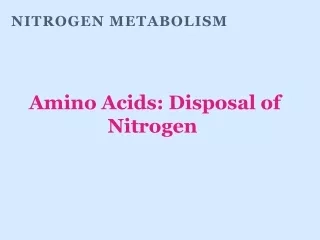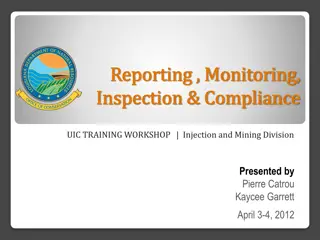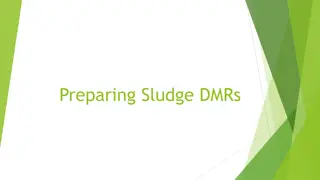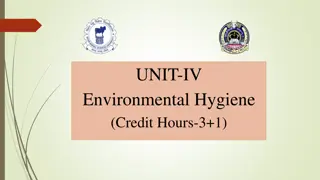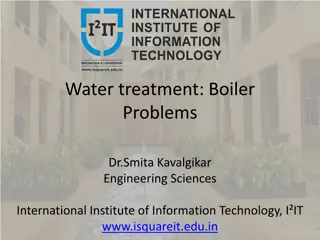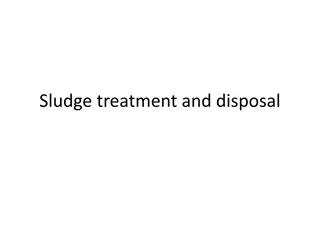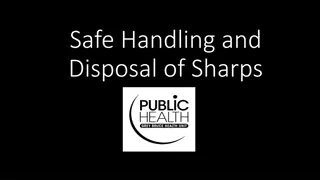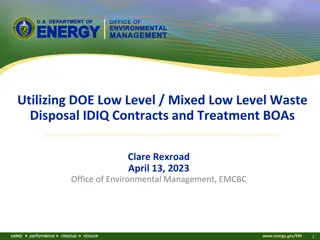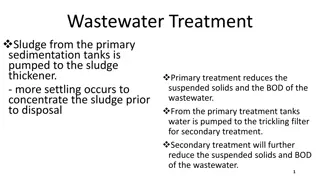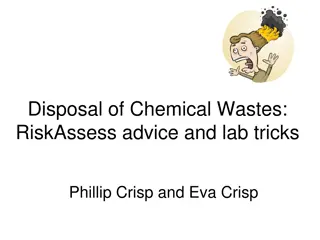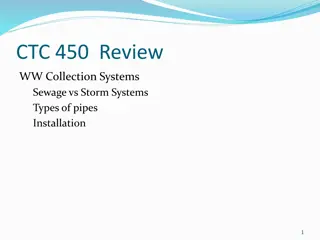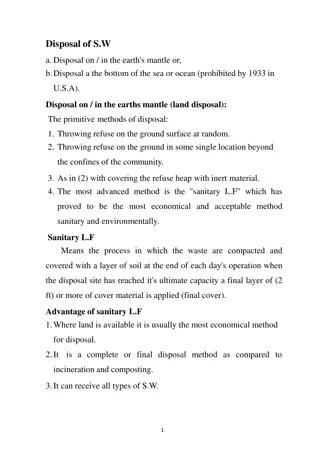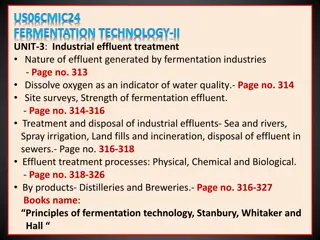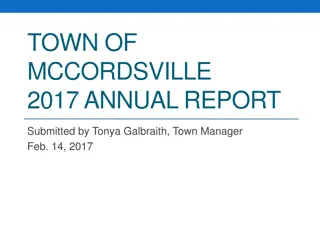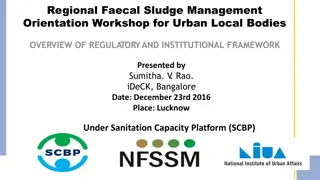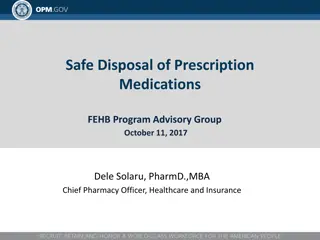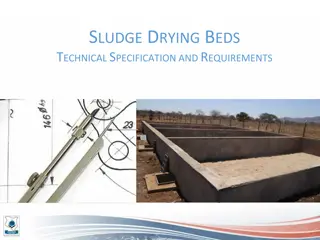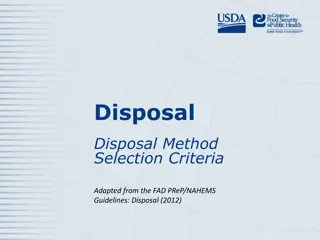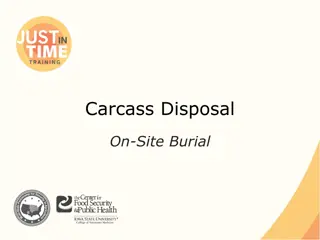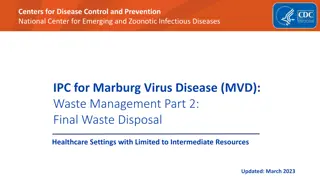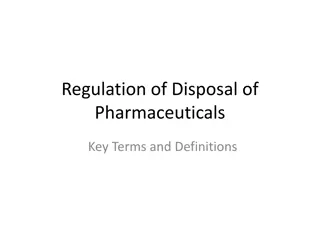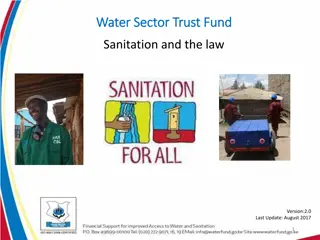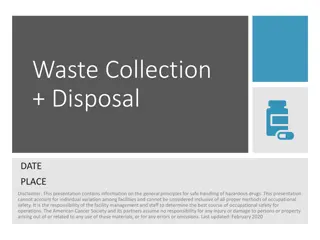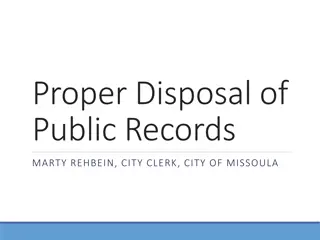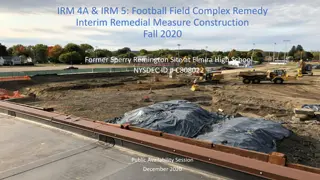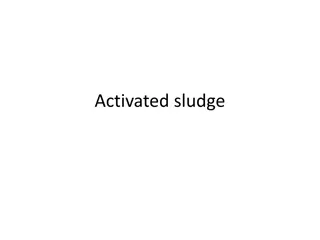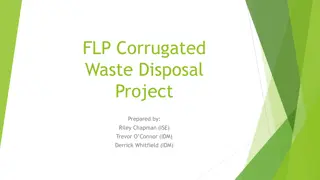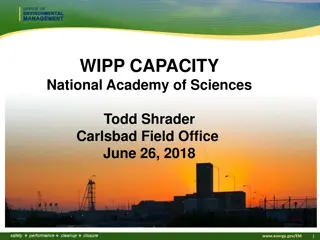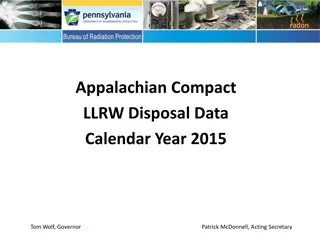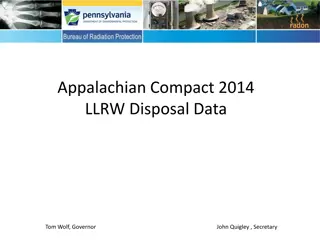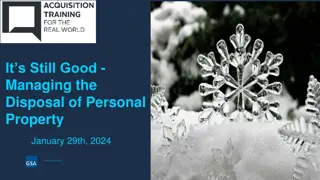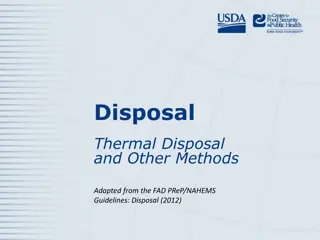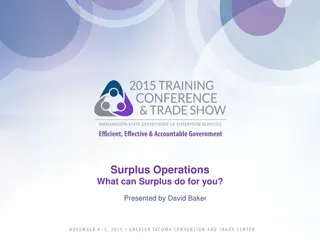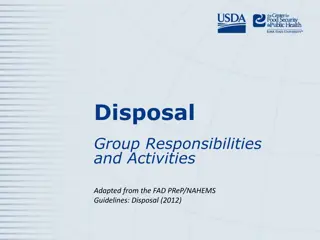Amino Acids: Disposal of Nitrogen
Overview of nitrogen metabolism with a focus on the disposal of nitrogen through amino acid catabolism. It explains the process of removing the α-amino groups from amino acids, the synthesis of urea, and the conversion of carbon skeletons to energy-producing pathways.
36 views • 65 slides
NARA’s Regulation for Digitizing Permanent Records
NARA has issued regulations and guidance for digitizing permanent records, including the disposal of original analog records, with the aim of enhancing efficiency and accessibility. The process includes reviewing and updating regulations periodically, transferring metadata when records are transferr
1 views • 20 slides
Urban Mining and CDW Circular Economy Cost-Benefit Analysis
This case study focuses on comparing the cost and greenhouse gas emissions savings of local processing and reuse of Construction and Demolition Waste (CDW) materials versus sending them to landfills. By developing a prototype cost and GHG savings calculator, the aim is to showcase the potential of e
0 views • 14 slides
Annual Disposal/Injection Well Monitoring Report Workshop Overview
Discover the key aspects of UIC Form UIC-10 and its instructions for reporting, monitoring, inspection, and compliance in the Injection and Mining Division. Learn about the annual submission requirements, community well information, and the Source Fluid Attachment process. Get insights into handling
0 views • 32 slides
Proposed Changes to Guam's Toilet Facilities and Sewer Disposal Act
Current controversies surrounding residential lot sizes, lack of flexibility in existing laws, and rising nitrate levels have prompted the introduction of Bill 175-37 (COR) in Guam. The bill aims to address shortcomings in existing regulations by allowing the development of 1/6 acre lots with Type 4
4 views • 10 slides
Understanding Sludge Disposal Regulations in Oklahoma
Major facilities in Oklahoma must adhere to specific regulations when disposing of sludge, with two primary methods of disposal: Landfill and Land Applied. EDMRs must be submitted annually by February 19th, covering the previous year. Testing requirements include Toxicity Characteristic Leaching Pro
0 views • 30 slides
Ensuring Hygienic Disposal of Carcasses and Fallen Animals
Disposing of carcasses and fallen animals is a crucial responsibility for veterinarians to maintain environmental hygiene and prevent health risks. Improper disposal can lead to the spread of diseases and attract pests. Various methods, such as burial, cremation, and incineration, are used to ensure
0 views • 22 slides
Understanding Water Treatment and Boiler Problems in Engineering Sciences
Water treatment is crucial for boiler systems to prevent scale and sludge formation, ensuring efficient steam generation. Proper treatment of boiler feedwater, control of dissolved solids, and maintaining ideal water composition are key aspects discussed in detail. Scale and sludge formation are com
0 views • 12 slides
Sludge Treatment and Disposal Methods in Wastewater Management
This comprehensive guide covers various aspects of sludge treatment and disposal in wastewater management processes. It includes information on the composition of sewage sludge, production estimates, sludge content percentages, and calculations for determining sludge volume under different treatment
0 views • 17 slides
Proper Handling and Disposal of Sharps - A Community Safety Concern
Improper disposal of sharps poses risks to public safety as it can lead to injuries from needles contaminated with blood-borne infections. This article emphasizes the importance of safe handling and disposal practices for sharps, including drug paraphernalia, to protect both individuals and the comm
0 views • 21 slides
Utilizing DOE Low-Level & Mixed Low-Level Waste Disposal Contracts
EMCBC manages disposal and treatment contracts for Low-Level Waste (LLW) & Mixed Low-Level Waste (MLLW). Eligible users include DOE offices, prime contractors, and subcontractors. Services cover various waste types including radioactive materials, sealed sources, and TSCA-regulated waste. Specific c
0 views • 19 slides
Overview of Wastewater Treatment Processes
Wastewater treatment involves primary and secondary processes to reduce suspended solids and BOD levels. Primary treatment utilizes sedimentation tanks followed by sludge thickening, while secondary treatment involves biological methods such as trickling filters. Various secondary treatment methods
0 views • 15 slides
Advanced Treatment Processes for Faecal Sludge Management
Treatment processes for faecal sludge management involve various stages including preliminary treatment, primary treatment, secondary treatment, and tertiary treatment. Each stage employs mechanical, biological, and chemical processes to separate, decompose, and remove contaminants from the sludge,
0 views • 7 slides
Proper Chemical Waste Disposal: Advice and Best Practices
Learn how to safely dispose of chemical wastes in compliance with local regulations. Follow expert advice on waste collection, avoid sewer and garbage disposal, and prioritize safety to minimize environmental harm. Training on responsible disposal practices is essential for creating a culture of sus
0 views • 18 slides
Water Quality Monitoring and Procedures for Effective Environmental Management
This document outlines the monitoring tasks, water quality regulation, parameters to be monitored, sample collection locations, and procedures for on-site monitoring in a wastewater treatment facility. It covers essential aspects such as level of sludge and scum, TSS, TDS, BOD5, pH, COD, DO, nitroge
0 views • 9 slides
Overview of Wastewater Collection and Treatment Systems
Explore the evolution of wastewater treatment processes, from Imhoff tanks to activated sludge systems. Learn about the history of sewage and stormwater collection, different types of pipes used, installation methods, and the importance of designing systems to combat diseases. Discover how processes
0 views • 46 slides
Efficient Methods and Considerations for Solid Waste Disposal
Efficient methods for solid waste disposal include sanitary landfilling, which involves compacting waste and covering it with soil daily. Advantages of this method include economic viability and flexibility in waste disposal. However, challenges such as limited suitable land availability and potenti
0 views • 10 slides
Industrial Effluent Treatment in Fermentation Industries
Fermentation industries generate various types of effluent containing organic matter, solids, and other waste materials. With stricter regulations on waste disposal, efficient treatment methods are essential for controlled disposal. This includes physical, chemical, and biological processes to treat
0 views • 84 slides
Town of McCordsville 2017 Annual Report Overview
In 2016, the Town of McCordsville had a successful year with various grants secured for community projects. Notably, efforts were focused on CR 600 West, including engaging with state leaders and the County Redevelopment Commission. The town served as a hub for events, finalized partnerships for inf
0 views • 27 slides
Legal and Regulatory Framework for Faecal Sludge Management in India
This overview discusses the legal and regulatory framework surrounding faecal sludge management in India, highlighting the current gaps and challenges. It touches upon the absence of specific sanitation laws at both central and state levels, the constitutional basis for the right to sanitation, and
0 views • 18 slides
Safe Disposal of Prescription Medications: Importance and Methods
Proper disposal of prescription medications is crucial to prevent harm to children, pets, and the environment. Safely dispose of unused medications to avoid accidental poisoning, misuse, and pollution of water sources. Methods include using authorized collectors, pharmacies, and take-back events, an
0 views • 5 slides
Sludge Drying Beds Technical Specifications and Requirements
This document outlines the technical specifications and requirements for sludge drying beds. It covers aspects such as subsurface compacting, lining materials, underdrain pipes, filter media, and slabs. The beds are designed with specific slopes for drainage efficiency and proper placement below gro
0 views • 6 slides
Guidelines for Animal Disposal Methods
Environmental and biosecurity guidelines recommend various disposal methods such as composting, rendering, permitted landfill, unlined burial, fixed-facility incineration, and open-air burning. Each method has specific selection criteria and considerations to minimize risks to the environment and bi
0 views • 17 slides
On-Site Burial for Carcass Disposal: Methods and Environmental Impacts
Explore the process of carcass disposal through on-site burial, covering topics such as trench burial, site selection, construction and design considerations, environmental impacts, and a comparison with other disposal methods. Learn about key factors influencing on-site burial, including soil prope
0 views • 13 slides
Proper Waste Disposal in Healthcare Settings for Marburg Virus Disease
In healthcare settings, proper waste disposal is crucial during outbreaks like Marburg virus disease to prevent health risks for patients, staff, and the community. This involves incineration or non-burn treatment of infectious waste before disposal, emphasizing the importance of appropriate waste m
0 views • 16 slides
Regulations and Disposal of Pharmaceuticals Key Terms
Understanding the regulations around the disposal of pharmaceuticals is crucial to protect the environment and ensure safe practices. Unwanted pharmaceuticals should not be disposed of with regular trash or flushed as they can affect water resources. Incineration, governed by federal Clean Air Act r
0 views • 7 slides
Waste Disposal Regulations and Guidelines for Sanitation
Guidelines for waste disposal and sanitation laws under the Public Health Act are outlined, including definitions of nuisances, prohibitions, penalties, and training programs for sanitation teams. Failure to comply with regulations can result in fines. Proper waste handling and disposal are essentia
0 views • 8 slides
Proper Handling and Disposal of Hazardous Drugs and Waste
Guidelines for the safe handling and disposal of hazardous drugs and waste in healthcare facilities. The content covers training modules, waste collection, sources of healthcare waste, disposal methods, and legal regulations related to the disposal of hazardous drugs. Various types of healthcare was
0 views • 21 slides
Proper Disposal of Public Records Guidelines in Montana
Guidelines for proper management and disposal of public records in local government entities in Montana, outlined under HB 123 passed in 2015. The Local Government Records Committee (LGRC) oversees records retention schedules and reviews disposal requests. Contact LGRC for questions or assistance re
0 views • 24 slides
Football Field Complex Remedy Project Overview
The project involves remedial measures for the football field complex at Elmira High School, focusing on soil removal, groundwater monitoring, and vapor intrusion prevention. Excavation, disposal of hazardous waste, and construction of institutional controls are key components. Plans for interim rem
0 views • 15 slides
Overview of Activated Sludge Process in Wastewater Treatment
The activated sludge process involves maintaining a biological mass in suspension within a reactor through mixing. Bacteria are returned from the clarifier to maintain high solids concentration. The principle of this system revolves around sludge age and equilibrium. Different types and modification
0 views • 16 slides
FLP Corrugated Waste Disposal Project Overview
This project aims to improve the efficiency and cost-effectiveness of the current corrugated waste disposal process. By implementing alternative designs and reengineering processes, the goal is to increase labor efficiency by 10%, reduce waste disposal costs by 10%, and provide recommendations for s
0 views • 8 slides
WIPP Waste Disposal Capacity Overview
The Waste Isolation Pilot Plant (WIPP) has a statutory capacity of up to 175,565 cubic meters for disposal of transuranic waste. As of June 2018, 93,500 cubic meters of TRU waste have been emplaced at WIPP. The facility operates within the 16 square mile land withdrawal boundary specified by the WIP
0 views • 8 slides
Disposal Data of Appalachian Compact LLRW 2015
The data from the Appalachian Compact LLRW disposal activities in the year 2015 includes information on disposed volume and activity by state and facility type. Figures show cubic feet and curies disposed, detailing academic, government, industry, medical, and utility sectors. The disposal sites wer
0 views • 12 slides
Appalachian Compact 2014 LLRW Disposal Data Analysis
This data analysis showcases the disposed low-level radioactive waste (LLRW) volumes, activities, and trends as part of the Appalachian Compact in 2014. It provides insights into LLRW disposal by state, facility type, and activity levels, covering academic, government, industry, medical, and utility
0 views • 10 slides
Proper Management of Personal Property Disposal Process
Explore the steps involved in managing the disposal of personal property efficiently, including internal screening, excess screening, and utilizing resources like PPMS and NUOs. Learn about the various methods of disposal such as transfer, donation, and public auction. Discover how to identify if yo
0 views • 47 slides
Thermal Disposal Methods for Animal Carcasses: Guidelines and Best Practices
Explore thermal disposal methods adapted from the FAD PReP/NAHEMS Guidelines for effectively managing animal carcasses. Learn about high-temperature combustion, fixed-facility incineration, open-air burning risks, and air-curtain incineration techniques. These methods vary in efficiency, environment
0 views • 17 slides
Surplus Operations: How We Help Agencies Manage Property Efficiently
Surplus Operations, presented by David Baker, offers property management services to agencies including state and local governments, municipalities, school districts, and non-profits. Their mission is to recover, reuse, or recycle property to avoid disposal, saving money for agency partners. Service
0 views • 34 slides
Guidelines for Disposal Group Responsibilities and Activities
Responsibilities and activities of the disposal group adapted from FAD PReP/NAHEMS guidelines include roles such as disposal method recommendations, organizing and directing activities, ensuring procedures are carried out, and performing disposal tasks. The group aims to mitigate pathogen spread, sa
0 views • 16 slides
Top Tips for a Smooth Garbage Disposal Installation in San Diego
Installing a garbage disposal can be a simple yet effective home improvement activity for your kitchen. With the disposal, you save your kitchen from trash while at the same time ensure proper clean-up after meals. Contact us now.\nFor more info - \n
0 views • 5 slides
